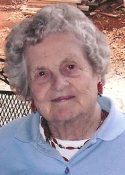
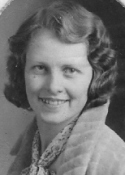 The first house I can remember, it was probably where I was born, was a log house across the lane from the rock house where grandma Richins lived. This house was large enough for two families, now days it would be called a duplex. Uncle Newel and aunt Jenny Richins lived in the back part. No electricity, we used coal oil lights. I remember when I was a few years older, it was my chore to clean the chimneys on Saturdays with news papers and clip the wicks so they were rounded off. Myrtle related when we had a fire with one, scary indeed, I sure remember that.
The first house I can remember, it was probably where I was born, was a log house across the lane from the rock house where grandma Richins lived. This house was large enough for two families, now days it would be called a duplex. Uncle Newel and aunt Jenny Richins lived in the back part. No electricity, we used coal oil lights. I remember when I was a few years older, it was my chore to clean the chimneys on Saturdays with news papers and clip the wicks so they were rounded off. Myrtle related when we had a fire with one, scary indeed, I sure remember that.
I remember going down to grandma Paskett’s house, in one of the bedrooms upstairs, they now bad a lovely frame two-story home, spending hours listening to music on a cylinder phonograph with a big cone shaped loud speaker –later a treat of honey, home made bread, and a tall glass of milk.
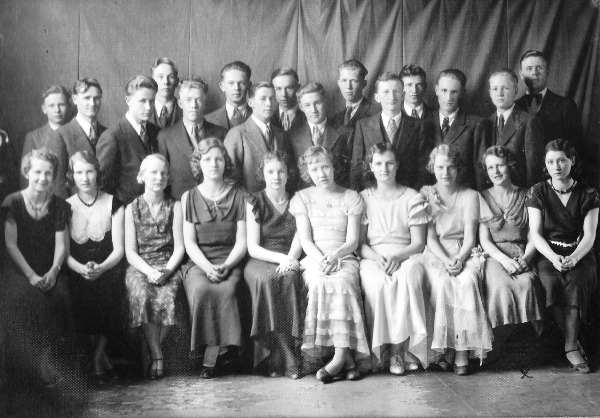
1933 Declo High School – Elsie Richins, second from right
Aunt Eliza would come from Ogden and spend part of each summer, this was a treat for us, and our cousins were about our age. I particularly remember Amy, she could play the piano and we would go into grandma Richin’s parlor and Amy would play the lovely grand piano. One song that stands out in my memory is “Beautiful Ohio.” I have the piece and every time I see it, I go back to those years of my childhood.
We didn’t have such things as sleeping bags in those days, mama would put 5 or 6 of us in a bed cross ways. I don’t imagine we slept much but we had a lot of fun. We had no drinking water there. Dad would bring the water in a big 50 gallon wooden barrel, from across the lane. There was a creek not far from the house where we got water for house hold use; I was baptized in that creek.
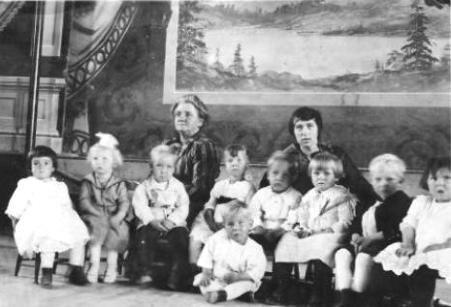
Elsie Richins Kindergarten Class
We moved from there to another log house with a dirt roof, this house was to the North around the dug way. All of you know where. I might say here that most of the houses were that kind so we thought nothing of it. We really liked it there because we could not only walk to school and church but to a store – we thought it was really a great store, as it had a hotel above it. Like Sarah said, we used to take a hand full of eggs to the store and buy candy. One day the storekeeper asked mama if she had missed some eggs. He said some kids brought some and he knew they were ours because he said ours were the biggest eggs in town. I remember when that store and hotel burned down. It shook the windows in our house and we could hear the beds in the hotel part falling down as the floor burned out tram under them.
I remember when Myrtle was born, we came home from school for lunch and were told we had a baby sister; we immediately ran out in the street and told the kids passing by, with sister Hadfield or sister Blanthorn, I can’t remember which, running after us saying, “ere, ere, come back ere.” They were the midwife and nurse.
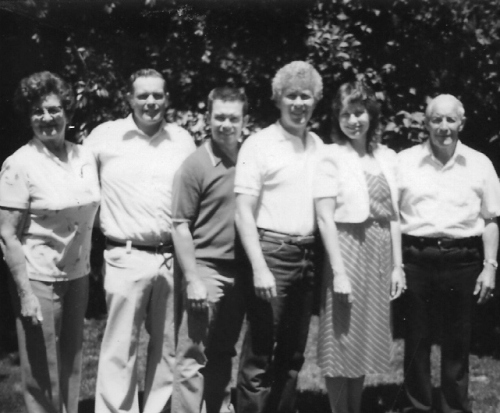
Elsie Williams, Vernon Williams. Wilford Williams. Kenneth Williams, Phyllis Williams Parker & Vernon Williams-1983
From there we moved to another log house next to the church and school – three rooms, but we did have running water in the kitchen. Orva had a bed in an end of the kitchen, Sarah. Lucille, and myself slept on a cot that made up into a bed in the living room. Myrtle had a crib behind the living room door. The living room was a fairly large room. There was a table in the middle. a beautiful cupboard, which would now be called a hutch, mama’s piano (she was Ward Organist), a dresser and a pot bellied stove, lots of home made throw rugs on the bare wooden floor, a rocker and chairs around the table, 1 remember that cozy home so well.
Dad was bishop and also responsible for keeping the church clean and plenty of firewood. There was a little stove in each classroom and we kids carried wood each week to each room and helped with the cleaning. There was one thing dad wouldn’t let us do on Saturday and that was dust the chapel and stairway, he said it had to be done Sunday morning. We didn’t like that too well. Sometimes we would just be finishing as people began to come. For you generations who have been to G.C., it wasn’t always like it looks today, even though there is electricity now, it used to be a lush little valley with lots of cattle, sheep, and horses. All the activity was created around church. We had neat 4th and 24th celebrations. The rodeo used to be held in the ball park across the road from Grandpa Richin’s house — real wild horses, not trained ones like they have today.
We used to create our own entertainment — as there were rolling hills right in town, a group of us would get together in the early .welling and play run sheep run. I had many a skinned knee falling over the sage brush. I also remember gathering beautiful sage lilies from those hills and riding stick horses over them with my cousins Mertrice and Thressa Ballingham who lived next door.
Mama was also primary president and I still have a little booklet with cards and attendance stars on with her signature on each card. Those were happy years.
I must not forget Grandpa and Grandma Richin’s golden wedding party held at the church. What a gala affair that was with relatives coming from all over, who had moved away.
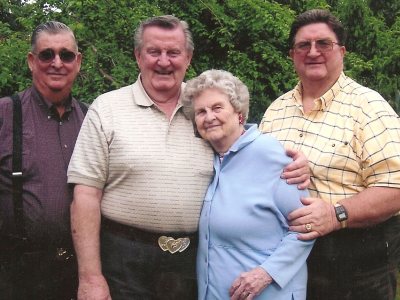
Elsie Richins Williams & Sons
Then a sad thing came into our lives. Our dear mama passed away the morning of Christmas Eve in 1925. We all grew up that Christmas, all too soon. That holiday hasn’t been the same for me since. I can still see dad coming out of the bedroom with that tiny baby, Leola, and grandma Richins saying, “Do you want me to take her Wilford?” So – there we were with Sara having to cope with the house hold chores, with the help of the rest of us, when she could get us to. I want to say here — Orvaand Sarah, if I do not have all the facts right, remember they were seen through the eyes of a little girl not yet 11 years old.
We used to take turns staying a few days with Aunt Hattie, a favorite aunt who was taking care of her aunt and uncle that had raised our mother from a baby. Since her mother had died, so, as Orva said in his history, we had 3 sets of grandparents, grandpa and grandma Betteridge were added. We dearly loved to go up there with Aunt Hattie and our “grandparents.”
Dad used to take us with him when he went on haying jobs, aunt Hattie and aunt Charlotte did the cooking and I imagine Sarah did much of the looking after of us kids. We thought this was great fun.
In 1927, dad asked us how we would like it if he married Aunt Hattie. We were all very happy. I can not remember who all went with them to Salt Lake, but I know I went as far as aunt Eliza’s on a train over great Salt Lake, what a thrill that was, with water splashing up on the train windows. Dad had sold our house so after returning from the marriage, we stayed with grandpa and grandma Paskett until our move to Idaho. Our house in Idaho seemed like a mansion, 8 rooms and a room for a bath (no water in the house yet), and 40 acres of land. How I wished our mother could have lived in that home with a shingled roof.
As I have stated, there wasn’t drinking water on the place so we had to carry it from the neighbors Clarence and Helen Weeks. We didn’t like this much because they had some large geese. If the gate would squeak or the hand pump they would hear us and come running, flapping their wings, “wrap them around our legs and pinch our legs and that would hurt. We would try to be real quiet, alas, they always won.
We lived a quarter of a mile from a canal and most every night kids would gather there and swim. Dad was a little uneasy about us joining them: but none of us drowned. In those early years, all of the kids were girls except Orva, so we had to help out in the fields. I remember hating thinning beets most of all. Our new mother, Aunt Hattie, made pads for the knees of our overalls and we crawled along eating dirt an day. There were also potatoes to pick up and hay to haul. Poor dad had a sorry crew until he could afford to hire men. In later years some came from Grouse Creek and stayed all summer. I well remember our table stretched to its full length with mom cooking for all. After the men took our places, we girls went looking for jobs; house work was all I knew how to do. I worked for $3 a week doing all the house work, cooking and washing for John and Made Darrington, as Marie was an invalid. Some of you won’t believe it but you could buy a Sunday dress for under $5. I also worked for Florean Penrod, Vern’s sister and at Kings Variety store in Burley on Saturdays. I made as much on Saturday in one shift as I made all week doing housework.
A little now about Vern – his folks had homesteaded a farm of 80 acres one mile to the North of us. They come there in 1904. The land was covered with sage-brush when they came and they cleared the land and made a productive farm out of it. They started out in a log house which is now used for a barn since the new modem home was built. I can’t get Vern to sit down and talk to me about his early life but I will tell a few things I have heard him mention over the years that our kids may be interested in. His main chore was riding derrick horse at haying time. His sister VeIma, 2 years older than he is used to hide him on the top of an old cupboard in the coal house so he wouldn’t have to work and be around to play with her. He said the first job he had for money. He was so proud to get his first pay check. He went to the store to buy something and the storekeeper said this man’s check was no good, so Vern tore the check up. One time after a wet football game he came home and wanted to dry his shoes out. so he put them in the oven, his mother got up in the morning and built a fire to get breakfast, soon she smelled something odd, she felt so bad as she brought his shoes to him both fitting easily in the palm of one hand.
Vern and I courted all through high school; I first met him when I was a freshman. I guess our first date was a toss up between me and some other girl. Vern’s fiend Frank Ballard asked him who he wanted to try and get a date with, I think it was one Saturday afternoon, Vern said it didn’t matter to him, so it turned out to be me. In those days most of the school dances were to be with dates, sometimes they would have the girls ask the boys.
We were married the year after I graduated, in 1934 in Ogden Utah, I was at the time living with Aunt Eliza. Vern was renting his mother’s farm, so we lived in a small house on the farm. Leyon was born in 1938. For the benefit of you young people, I must tell you this – the Doctor bill was only $35, I had a private room in the hospital which cost $35, and was brought home in an ambulance for free. Now what do you think about the “good ole days” The morning after I got home we had threshers for breakfast, with the help of Vern, no one knew there was a baby in the house.
March I, 1941 we left Declo and moved to Lakeview Oregon. Vern’s brother Elmer had bought a ranch there and we decided to move with him. We only lived there 3 years. While there our second boy Devon was born (1942). There was only a small branch of the church there so our help was really welcome. We lived 7 miles out of town on a ranch. I think LucilIe was the only one who came to see us besides a couple of Vern’s brothers, I’m sure they thought it was a million miles from no where. Do you remember hitching a ride from Burns Oregon, Lucille?
February I, 1944, Carl Day asked Vern to move to Cottonwood California, and work for him on a big ranch where they raised cattle, so we picked up and moved again. Little did we know we would spend 34 years there. We saw the church grow from a little Sunday School meeting in the barns, to a stake center. Needless to say, there was plenty for us to do and we were grateful to be a part of helping the church to grow, and we grew right along with it.
On May 1, 1946, our third boy was born, Kenneth, he turned out to be the missionary in the family. In 1950, our only daughter was born, Phyllis, couldn’t believe we had finally been given a daughter, we spoiled her plenty.
A lot could be said about the years the kids were growing up, but I will leave that up to them for their history. I will say that they had a super dad that spent many hours with the boys in their sports, in their school, little league, and church activities. He was the athletic director in the Stake and the Ward. He was also in the Branch presidency for 8 years (we lived in the mission).
Vern was also civic minded, besides working with the school sports, he was on the school board for 11 years and on the cemetery board for 6 years. As to his work, he was a real-estate salesman in the day time and worked at the saw mill firing boilers on the graveyard shift.
In February, 1969 another tragic experience happened, both of my parents were killed in a car wreck in Idaho. A double funeral was held. So now neither of us can ever go “home.” We would like to keep our parents with us forever but life doesn’t work out that way.
While in California we had been going to the temple only once a month, since it was a 4 hour drive, so we talked about moving to a city where there was a temple when we retired. The time came May 1. 1978. We decided to move to Orem, Utah, since our son Kenneth lives there and also Vern’s brother Elmer. We are also closer to most of our brothers and sisters in Idaho.
The two Wards had us a farewell party and presented us with a lovely friendship quilt. It was real hard to leave the good friends we had made there over the years and harder to leave our daughter Phyllis and granddaughter Charissa, but we are happy here in Utah with all our new friends. We are both busy in the Ward and are temple ordinance workers three days a week and love it.
We are the proud grand parents of nine grandchildren. We only wish we lived closer to them so we could properly spoil them, which I understand is a grandparent’s privilege.
By Elsie R. Williams December 1980
Elsie and Vern enjoyed many family gatherings while living in Utah. Thanksgiving was always a special occasion with most of their children and grandchildren coming every year for lots of fun and wonderful food. Elsie make sure the cinnamon rolls were ready upon arrival and the cookie jar was always full and lots of extras baked for refilling that great cookie jar. Vern always rough housed with the grandkids and the pool table in the family room was in use most of the time.
During their years in Utah they enjoyed many good times with their son Ken and his family as they lived just a short distance away. They enjoyed having several grandchildren over during their college days at BYU. The kids knew there was always a hot meal waiting if they had the time to stop by.
Elsie’s brothers and sisters took several trips together as a large group which they enjoyed very much. Family reunions in Elsie’s family were very much enjoyed by all and they are held every 2 years.
They made many wonderful friends while working in the Provo Temple and cherished the years they were able to serve there.
On May 14, 1993 Vern passed away and it was a very sad day for Elsie and the rest of the family. Elsie continued to work at the Provo Temple and lived in Utah until 1999. In the spring of 1999 Elsie moved to Shasta Lake, California to be near her daughter Phyllis and son in law, Bill. She purchased a new manufactured home and lived on the same property as her daughter. Phyllis and family enjoyed many wonderful years with her so close by and she brought much joy to their life. She enjoyed watching the garden grow and sampling the fresh produce and sampling her favorite fruit trees. The flowers brought her special joy and the lilacs were her favorite.
She enjoyed camping and sitting around the camp fire. Her greatest joy was visiting with her family and always looked forward to their visits and phone calls. Her grandson and wife named their daughter Elsie Grace Williams which was such an honor for her. Her kind and giving nature will always be remembered by all who knew and loved her.
Elsie. D. Williams passed away on April 15, 2010 after a short illness. She was 12 days away from her 95th birthday. She passed away at her home in Shasta Lake, CA. Her service was held on April 24 and she was laid to rest in the Declo Cemetery next to her husband, Vern in Declo, Idaho.
The following poem was written by Bill Parker, her son in law as tribute to a wonderful sweet mom.
The Day The Lilacs Bloomed
After days of rain and winter gloom,
the sun came up to a small bird’s tune.
That was the day the lilac bloomed.
“Is everyone here?” the lady would say
As a steward of homesteads she
would ask us each day.
Cinnamon rolls
kitchen clothes,
babies on lap,
no time for a nap,
Make things for ’em all
no way would she stall.
Until this fine day,
she has gone away.
And this, I’m assumin’
Is why the lilac’s a bloomin’
